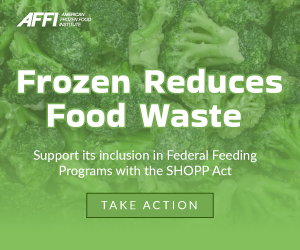Arlington, VA – The American Frozen Food Institute (AFFI) today commended the U.S. Department of Agriculture (USDA) and U.S. Department of Health and Human Services (HHS) for releasing the 2020-2025 Dietary Guidelines for Americans (DGAs) that outline science-based recommendations designed to foster healthy dietary patterns for Americans of all ages, which can be achieved with frozen foods.
The DGAs are published every five years to reflect the most current nutrition science and have an important role in guiding federal nutrition policy.
“AFFI applauds the administration for recognizing the benefits of frozen foods to help Americans of all ages Make Every Bite Count,” said AFFI President and CEO Alison Bodor. “At a time when food and nutrition insecurity are all too prevalent, frozen foods play a critical role in providing affordable access to a varied, balanced and nutrient dense option of foods while reducing food waste.
In fact, menu modeling shows that diets featuring 95 percent frozen foods (90 percent of calories) can meet MyPlate food group recommendations for grains, fruits, and vegetables, as well as nutrient recommendations for calories, fat, saturated fat, sodium, fiber, vitamin A, vitamin C, and calcium.[1] That variety of options available in the frozen food aisle make it easy to customize and enjoy food and beverage choices to reflect personal preferences, cultural traditions, portion size and budgetary considerations.
“The importance of frozen foods, especially among vulnerable populations, cannot be overstated,” added Bodor.
The DGAs underscore the importance of eating nutrient-dense foods and beverages, including vegetables of all types and whole fruits.
Research suggests that frozen fruit and vegetable consumers eat more total fruits and vegetables that non-consumers.[2] This is consistent with Produce for Better Health Foundation (PBH) research that shows availability[3] and preparation[4] of all forms of fruits and vegetables in the home is associated with greater produce consumption overall.
“Consumers consistently tell us ease of preparation, being a cost-effective meal solution and fewer trips to the grocery store are key drivers for purchasing frozen foods,” said Bodor. “AFFI is pleased to see the latest Dietary Guidelines for Americans provide ample opportunities for the inclusion of frozen foods.”
For more information on the benefits of frozen foods, please visit FrozenAdvantage.org.
About AFFI
The American Frozen Food Institute (AFFI) is the member-driven national trade association that advances the interests of all segments of the frozen food and beverage industry. AFFI works to advance food safety and advocates before legislative and regulatory entities on the industry’s behalf to create an environment where members’ foods and beverages are proudly chosen to meet the needs of a changing world. www.affi.org
[1] Hornick, Betsy. Menu Modeling Demonstrates Feasibility, Nutritional Value and Affordability of Frozen Foods. Today’s Dietitian. November 2015 Supplement. https://viewer.zmags.com/publication/1b2da3ad#/1b2da3ad/1.
[2] Storey M, Anderson P. Total fruit and vegetable consumption increases among consumers of frozen fruit and vegetables. Nutrition. 2018;46:115-121. https://pubmed.ncbi.nlm.nih.gov/29290348/
[3] Produce for Better Health Foundation. Novel Approaches to Measuring and Promoting Fruit and Vegetable Consumption, 2017. Available at: https://fruitsandveggies.org/.
[4] Produce for Better Health Foundation. Primary Shoppers’ Attitudes and Beliefs Related to Fruit & Vegetable Consumption, 2012-2016. Available at: https://fruitsandveggies.org/research/.




